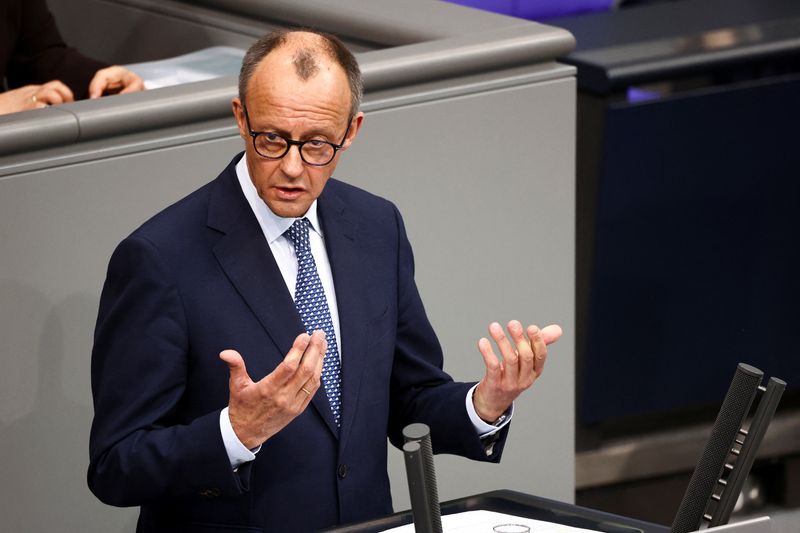By Andreas Rinke and Holger Hansen
BERLIN (Reuters) – German Chancellor-in-waiting Friedrich Merz was set to make a last-ditch attempt on Friday to convince the Greens of his plans for a massive increase in state borrowing to bolster defence and infrastructure ahead of a parliamentary vote next week.
Merz is in a race against time to persuade the outgoing parliament to approve a 500 billion euro fund for infrastructure and sweeping changes to borrowing rules to revive growth and ramp up military spending in Europe’s largest economy.
Merz wants to secure the funds before a new parliament convenes on March 25, where they risk being blocked by an expanded contingent of far-right and far-left lawmakers. A vote on what would be a historic deal is slated for Tuesday.
“German politics is in cliffhanger mode, with time quickly running out,” said think tank Eurasia, revising down the probability of a deal to 65% from 85% previously.
To reach the two thirds majority required to change the constitution, Merz’s conservatives and likely future coalition partner the Social Democrats need the support of the Greens.
Talks so far have not yielded sufficient concessions to convince the Greens to back the deal, with the party worried the new funds might be used simply to finance policies such as tax cuts for the other parties’ own voter bases, while neglecting issues such as climate change and poverty.
Merz canceled a planned visit to Munich on Friday to instead continue talks with the Greens after a testy first reading in parliament on the proposed borrowing plans on Thursday.
“In my view, there are possible solutions,” Merz told state broadcaster ZDF. “I am confident that we will succeed in the next week.”
Outgoing economy minister Robert Habeck of the Greens agreed there were “still a few days left until Tuesday, and the talks are continuing at high pressure.”
Merz has justified the need to push the constitutional amendments through the outgoing parliament with the recent shift in policy in the United States under President Donald Trump, warning that a hostile Russia and an unreliable U.S. could leave the continent exposed.
Merz said on Thursday he had tried to address the Greens’ concerns by offering to expand the scope of defence spending to include civil defence and intelligence spending. Up to 50 billion euros from the infrastructure fund could be used for climate policies.
The parliamentary budget committee, which is expected to make a recommendation for Tuesday’s vote, postponed its meeting until later on Friday in anticipation of possible changes to the legislation, a source familiar with the matter said.
Failure to reach a deal could cripple coalition talks now underway between the conservatives and SPD, removing the financial basis for their plans. With few if any other viable coalition options in the new parliament, a failure to reach a deal could even lead to another snap national election.
(Reporting by Andreas Rinke and Holger Hansen; Writing by Sarah Marsh; Editing by Toby Chopra)
